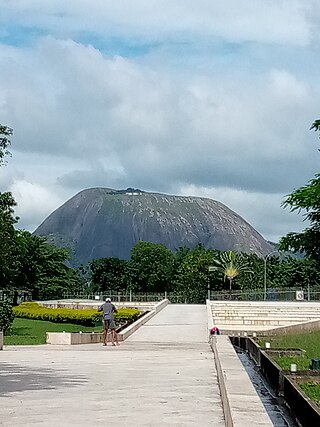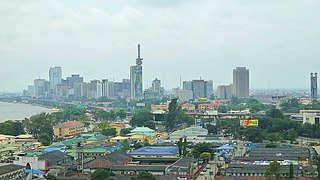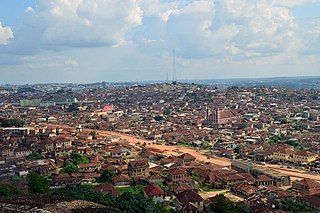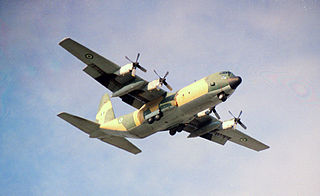
Nigeria, officially the Federal Republic of Nigeria, is a country in West Africa. It is situated between the Sahel to the north and the Gulf of Guinea to the south in the Atlantic Ocean. It covers an area of 923,769 square kilometres (356,669 sq mi), and with a population of over 230 million, it is the most populous country in Africa, and the world's sixth-most populous country. Nigeria borders Niger in the north, Chad in the northeast, Cameroon in the east, and Benin in the west. Nigeria is a federal republic comprising 36 states and the Federal Capital Territory, where the capital, Abuja, is located. The largest city in Nigeria is Lagos, one of the largest metropolitan areas in the world and the largest in Africa.

The history of Nigeria can be traced to the earliest inhabitants whose remains date from at least 13,000 BC through early civilizations such as the Nok culture which began around 1500 BC. Numerous ancient African civilizations settled in the region that is known today as Nigeria, such as the Kingdom of Nri, the Benin Empire, and the Oyo Empire. Islam reached Nigeria through the Bornu Empire between and Hausa Kingdom during the 11th century, while Christianity came to Nigeria in the 15th century through Augustinian and Capuchin monks from Portugal to the Kingdom of Warri. The Songhai Empire also occupied part of the region. Through contact with Europeans, early harbour towns such as Calabar, Badagry and Bonny emerged along the coast after 1480, which did business in the transatlantic slave trade, among other things. Conflicts in the hinterland, such as the civil war in the Oyo Empire, meant that new enslaved people were constantly being "supplied".

The Nigerian Armed Forces (NAF) are the military forces of Nigeria. The armed forces consist of three service branches: the Nigerian Army, Nigerian Navy, and Nigerian Air Force. The President of Nigeria functions as the commander-in-chief of the armed forces, exercising his constitutional authority through the Ministry of Defence, which is responsible for the management of the military and its personnel. The operational head of the AFN is the Chief of Defence Staff, who is subordinate to the Nigerian Defence Minister. With a force of more than 230,000 active personnel, the Nigerian military is one of the largest uniformed combat services in Africa. According to Global Firepower, the Nigerian Armed Forces are the fourth-most powerful military in Africa, and ranked 35th on its list, internationally.

Lagos or Lagos City is the most populous city in Nigeria, with an estimated population of 21 million in 2015. Lagos is the most populous urban area in Africa. Lagos was the national capital of Nigeria until December 1991 following the government's decision to move their capital to Abuja in the centre of the country. Lagos is a major African financial centre and is the economic hub of Lagos State and Nigeria at large. The city has a significant influence on commerce, entertainment, technology, education, politics, tourism, art, and fashion in Africa. Lagos is also among the top ten of the world's fastest-growing cities and urban areas. The megacity has the fourth-highest GDP in Africa and houses one of the largest and busiest seaports on the continent. Due to the large urban population and port traffic volumes, Lagos is classified as a Medium-Port Megacity.

Nnamdi Benjamin Azikiwe, PC, usually referred to Zik, was a Nigerian politician, statesman, and revolutionary leader who served as the 3rd governor-general of Nigeria from 1960 to 1963 and the 1st president of Nigeria during the First Nigerian Republic (1963–1966). He is regarded as the "father of Nigerian nationalism", for driving force behind the nation's independence.

Chukwuemeka "Emeka" Odumegwu Ojukwu was a Nigerian military officer and politician who served as President of the Republic of Biafra from 1967 to 1970 during the Nigerian Civil War. He previously served as military governor of the Eastern Region of Nigeria, which he declared as the independent nation of Biafra.

The Nigerian Air Force (NAF) is the air branch of the Nigerian Armed Forces. It is the youngest branch of the Nigerian Armed Forces. It is one of the largest in Africa, consisting of over 18,000 personnel as at 2021 and aircraft including 9 Chengdu F-7s, 11Dassault-Dornier Alpha Jets, three JF-17 Thunder Block II and 12 Embraer EMB 314 Super Tucano aircraft, 24 Ameracchi M-346 FAs on order, attack helicopters, armed attack drones, and military transport aircraft.

Ibrahim Badamasi Babangida is a Nigerian retired general and statesman who served as military president of Nigeria from 1985 until his resignation in 1993. He rose through the ranks to serve from 1984 to 1985 as Chief of Army Staff, going on to orchestrate his seizure of power in a coup d'état against Muhammadu Buhari.

Murtala Muhammed International Airport (MMIA) is an international airport located in Ikeja, Lagos State, Nigeria, and is the major airport serving the entire state. The airport was initially built during World War II and is named after Murtala Muhammed (1938–1976), the fourth military ruler of Nigeria.

Chief Moshood Kashimawo Olawale Abiola, also known as M. K. O. Abiola was a Nigerian businessman, publisher, and politician. He was the honorary supreme military commander of the Oyo Empire and an aristocrat of the Egba clan.

Chief Bola Ahmed Adekunle Tinubu is a Nigerian politician who is the 16th and current president of Nigeria. He was the governor of Lagos State from 1999 to 2007, and senator for Lagos West in the Third Republic.

Heartland Football Club founded as Spartans F.C., later known as Iwuanyanwu Nationale from 1985 to 2006 is a Nigerian football club based in Owerri. The team play their home games at Dan Anyiam Stadium. Their local rivals are Enyimba FC and Enugu Rangers. They reached the finals of the 1988 African Cup of Champions Clubs and 2009 CAF Champions League, the premier African continental club tournament, and won four straight Nigerian league titles from 1987 to 1990.

Owoye Andrew AzaziGSS DSS MSS CMH was a Nigerian army general who served as National Security Adviser to President Goodluck Jonathan, was Chief of Defence Staff (CDS) of Nigeria, and Chief of Army Staff (COAS). Before his first service chief appointment (COAS), he was General Officer Commanding (GOC) 1 Division, Kaduna State.

The Third Republic was the planned republican government of Nigeria in 1992 which was to be governed by the Third Republican constitution. In the Third Republic, there were democratically elected state governors and state assemblies and a democratically elected federal legislature. The republic was however not fully democratic as there was no democratically elected civilian president. The then military president Ibrahim Babangida's supposed transition eventually turned out to be a ploy to keep executive powers and grant the National Assembly limited legislative powers. Hence all laws passed by the Senate and House of Representatives will have to pass the National Defence and Security Council of Nigeria and finally approved by the President. So while Babangida changed the usual style adopted by preceding military leaders from Head of State to President, he will continue to postpone presidential elections and eventually annul the ultimate one held on 12 June 1993. The Third Republic can thus be described as half military and half civilian.

Joseph Edet Akinwale Wey was a Nigerian Navy Vice Admiral who served as head of the Nigerian Navy, acting foreign minister, and chief of staff of the Supreme Headquarters, making him the de facto vice president of Nigeria during Yakubu Gowon's regime.
Aloysius Iyorgyer Katsina-Alu was a Nigerian jurist and lawyer who served as Chief Justice of Nigeria from 2009 to 2011.

Abeokuta is the capital city of Ogun State in southwest Nigeria. It is situated on the east bank of the Ogun River, near a group of rocky outcrops in a wooded savanna; 77 kilometres (48 mi) north of Lagos by railway, or 130 kilometres (81 mi) by water. As of 2006, Abeokuta and the surrounding area had a population of 449,088.

St. Gregory's College, Lagos, is a Catholic Boys' School with boarding facilities, located 1.0 km from Tafawa Balewa Square in the vicinity of Ikoyi – Obalende, Lagos State, Nigeria.

On 26 September 1992 a Nigerian Air Force Lockheed C-130H Hercules crashed three minutes after take-off from Lagos, Nigeria. All 159 people on board were killed, including 8 foreign nationals. The aircraft was taking off at high weight and three engines failed. It had the manufacturer serial number 4624.
The following is a list of events in 2021 in Nigeria.
















